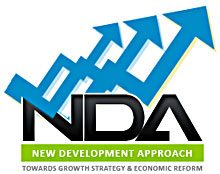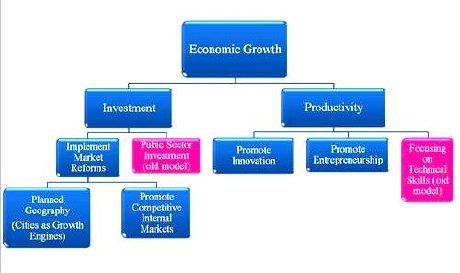Adil Najam
 (Editor’s Note: This is the first in a series on Pakistan’s New Growth Startegy. The Planning Commission of Pakistan has invited ideas and suggestions on this and we invite and encourage our readers to please help in highlighting the best and most innovative ideas they can think of. Have your say.)
(Editor’s Note: This is the first in a series on Pakistan’s New Growth Startegy. The Planning Commission of Pakistan has invited ideas and suggestions on this and we invite and encourage our readers to please help in highlighting the best and most innovative ideas they can think of. Have your say.)
I have been planning to write this post for most of a month. I have kept postponing because more sensational and urgent “news” kept coming in the way and I did not want our readers’ attention so diverted on the immediate that they ignored the important. All of this to say two things: First, I believe that the topic of this post is truly and deeply important and I really do hope that our readers will think very deeply about this and give us their very best feedback and ideas on this. Second, I was wrong in my original assessment and should really not have waited – the sensational and the urgent are forever with us (especially in Pakistan) and should never distract us from the important. And, ‘important’ is what this post is about!
The Planning Commission of Pakistan – now headed by Dr. Nadeem ul Haque, an out-spoken economist; international economic policy expert; former head of the Pakistan Institute of Development Economists (PIDE); and a friend and erstwhile contributor to ATP – has embarked on a fresh and bold initiative to develop a new growth policy for Pakistan – a ‘New Development Approach.’ At a time when many of us (I certainly stand accused) are caught up in the politics of the moment and immediate concerns, here is a strong, timely and very welcome initiative to think long-term – beyond the dynamics of today’s politics or this government or that – about exactly what will get our economic house in order on a sustainable and long-term basis. What do we need to do today, that will make improve economic and developmental conditions tomorrow?
With a refreshing and energetic zeal, Dr. Nadeem ul Haque has been reaching out to all elements of the Pakistani intelligentsia – universities, business sector, independent experts, citizens, the public -to think about this question and to give the Planning Commission their inputs, their ideas, their critique, their suggestions. Dr. Haque has also reached out personally to us here at All Things Pakistan to contribute to this national dialogue and discussion on exactly what is needed in a national growth strategy for Pakistan, and a new development approach for our future. I have every reason to believe that this is not an empty gesture, but an honest and real desire on his part to get a serious dialogue going on the best ideas for a growth strategy for Pakistan. I would urge our readers to seriously avail of this opportunity and to share their ideas and suggestions on this issue. Not every idea, of course, can or should be implemented, but I have high confidence that in this case your ideas will be read heard, digested and have a real chance of influencing the final shape of the national growth strategy. For those of us who have long cribbed that no one listens to us, here is a real invitation to be heard. Let us not disappoint!

In December, while in Pakistan, I had the opportunity to participate and speak at an event organized on the new growth strategy at the Higher Education Commission (HEC) which included some of Pakistan’s leading economic scholars as well as university leaders from across Pakistan. A lot of the confidence you sense in the paragraphs above comes from that experience. It was heartening to see our economic policy makers making a serious and heartfelt effort at inviting debate and ideas. It was more heartening to see universities being viewed and treated with the respect than knowledge producers deserve in all societies. It was even more heartening to see a real discourse and a thirst for ideas and a discussion that did start looking at the long-term questions of national development in the serious intellectual and ideational perspectives. What I think was most heartening was the clear sense in that room that ideas matter. In many ways, that is what any strategy is about – a discourse on ideas and an attempt to hit at the right idea about what should happen.
A rather long introduction, I realize, to introduce this series of posts. At this point, I thought starting with the general idea of a ‘growth strategy’ is what would work best. We will have more specific posts later, but at this point, when you think of growth for Pakistan, what are the type of things that come to your mind? Remember, this is not making a wish list or throwing out cynical jugats. What are the most strategic investments in policy, in idea and in resources that can be made today that will put Pakistan on a path to growth.
That Pakistan is in an economic mess is not in question. It is also clear that a central part of any solution – maybe even the first step – has to be to curtail the inefficiencies and wastes in the system – in terms of corruption at all levels and in terms of waste and excess. However, while that is necessary, it will not be sufficient. Simply given the demographic realities of Pakistan, a real growth impetus will be necessary. If the corruption and waste continues, this growth will be further stymied. But, even if the corruption and waste was checked real and sustained growth will be needed. Where do you think it can come from? And how? That, in essence, is the strategic question.
The new development approach that Dr. Nadeem-ul-Haque and the Planning Commission have begun the discussion with is built on four pillars:
- Increase productivity – Through Innovation
- Create Competitive Conditions – Through Internal Markets
- Urban Management – Through Creative Cities
- Youth Engagement – Through Mobilizing the Energies of the Young
There is, of course, much more beneath each of these ‘motors’ of growth – productivity, competitiveness, urban management and youth engagement. More importantly, what are the mechanisms in policy of unleashing the potential in these areas? And what other areas might one think of (knowing that long laundry lists of litany are not what strategy is made of!).
We will share more of what the Planning Commission and others are thinking of on these. But, first, we thought we should ask you what you think!


















































What growth can be expected in a country turned ‘Republic of Fear’ by Yazidi mullah?
Government’s role should be limited to a facilitator, the least they can do is provide tax breaks, subsidized electricity, cheap land to foreign companies that is willing to hire Pakistani labor in Pakistan.
If government can provide security, which in my opinion governments ultimate responsibility, private companies can take care of the rest. Any time in the history of Pakistan whenever there is a window of 3-4 years of peace, we have witnessed increase in foreign investments.
Only jobs that gov’t can create are worthless police, army and over crowd existing public offices with additional unqualified staff and give golden handshakes(forced retirement) to experienced and qualifies staff.
Elections are scheduled for 2013. We need to ensure that those are unbiased & fair. National concerns need to be addressed by parties and specific plans to improve the economic situation need to be proposed. Neglected provinces like Baluchistan need to be developed using their own revenue generated from the natural resources that have been found there. Pakistani firms need to be encouraged to mine and refine the deposits of gas, coal, copper & gold. If multinationals have to be employed they should be paid fee for service with bulk of the profit invested in developing Baluchistan where these reserves are located.
Some of the points mentioned in various posts here are more on the politics side and may be outside the scope of the planning commission’s work. The planning commission should mainly limit itself to one thing as far as politics is concerned. And that is to involve representatives of all political parties in a consultation process so that a political concensus can be developed at least on the broader points. This is neceessary to ensure the continuity of policies regardless of who is in power. If there is some continuity, even a semi-decent policy can deliver some results.
I personally won’t even mind if the army is also brought on board, given that it does play a role in politics, and is therefore a participant in the system whether we like it or not. Moreover, the military does manage so many cants all over the country (again, this is not about whether it should be in this business or not but strictly about the facts on the ground), so it is already involved in urban planning. Let the battle for the supremacy of elected governments be waged elsewhere and let this be strictly an exercise for developing a political concensus (between all players including the army) on the basic outlines of a long-term growth strategy. The media must also be involved.
Beyond that, there is little else the planning commission can do about politics.
The 4 goals mentioned by Dr. Nadeem are worthy, and to achieve them, we need to do several things, many of them mentioned in earlier comments. I will try to attribute them to national & subnational jurisdictions. We often dream of following the South Korean/Taiwanese route to prosperity, but fail to notice the size, population, ethnic homogeneity, unitary state set up and existential threats that shaped their leadership’s outlook towards nation building and progress. In Pakistan, if we are to grow, will do it not because of our leadership, but mostly inspite of it, and in this case, we will be following the footpaths of Indian entrepreneurs (and if we could just come out of our habit of self-loathing, we will recognize that our industrialists and agriculturalists have not done so badly over the years the years after all). So what our government needs is to precisely stop thinking of the welfare of its people, our masses are industrious and talented, and can take care of their welfare themselves, given opportunity. The federal government should rather be doing things that no one else can do in Pakistan, at least for the moment: providing electricity, constructing dams, developing communication infrastructure including both railways and roads, promoting hydrocarbon and mineral exploration & extraction… Provincial governments, on their part, need to focus on the provision of schooling and preventive health care, and ensuring the safety of life and property, leaving other tasks to the districts (which must be given more taxation powers). District governments will need to be much more public-friendly and welfare-minded than they have been so far, and will need to work on improving the urban life, making it more convenient, comfortable and fluid. Without serious urban planning and transportation facilities, our industry and services sectors will never be producvive enough.
Bottomline, strong emphasis on decentralization and devolution, government doing not many things, but doing them well, and giving the Pakistani awam space to grow: do this, and we will have laid the ground for a prosperous Pakistan.
The role of the planning commission in all this should be to help the federal, provincial and district governments in making their development plans. For example, for cities, the planning commission should develop guidelines on urban development.